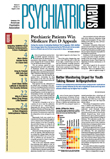Ten-year outcomes for patients with dual diagnoses of schizophrenia and substance abuse appear to be remarkably good across several measures of recovery.
A naturalistic, longitudinal study of 130 patients with co-occurring schizophrenia and substance use disorders found that participants improved steadily over 10 years in the outcome domains of symptoms, substance abuse, institutionalization, functional status, and quality of life, pointed out a report in the July Schizophrenia Bulletin.
Moreover, at 10-year follow-up, many had achieved “recovery” according to measures selected by the dual-diagnosis patients themselves: controlling symptoms of schizophrenia, remission from substance abuse, living independently, being competitively employed, having regular social contacts with nonsubstance abusers, and expressing overall life satisfaction.
Importantly, these six outcomes were only weakly interrelated over time, suggesting that recovery, as defined by patients, is a multidimensional concept.
“The long-term prognosis is good, so we need to bring hope to people with dual disorders and their families,” lead author Robert Drake, M.D., told Psychiatric News. “Further, people move toward recovery through many different paths, suggesting that we need to provide multiple options for them such as dual-diagnosis groups and self-help groups. That there are multiple dimensions of recovery, which are only weakly linked, means that we should start working clinically with clients where they have interest and understand that improvements in different areas of adjustment will occur over time in different patterns.”
Drake is a professor of psychiatry and of community and family medicine at Dartmouth Medical School.
The study examines the 10-year course of 130 patients in the New Hampshire Dual Diagnosis Study, a prospective, longitudinal study of patients with severe and persistent mental illness (chronic schizophrenia, schizoaffective disorder, or bipolar disorder) and co-occurring substance use disorder.
As part of that study, participants had previously entered a three-year, randomized, controlled trial of two forms of care management between 1989 and 1992, in which they received integrated treatment for their two diagnoses from their respective mental health centers for three years.
After the three-year study, participants who remained in treatment were released from their experimental conditions and received treatment as usual during the subsequent years.
To assess changes at the 10-year mark, recovery outcomes and cutoffs for the current study were defined as follows:
•
Absence of clinically significant symptoms as indicated by no average subscale sore of greater than 3 on the Brief Psychiatric rating Scale.
•
Attainment of the late active treatment stage or better as indicated by a Substance Abuse Treatment Scale score greater than 5.
•
Residing more than 80 percent of days in one's own home.
•
Holding a job in the preceding year that pays at least minimum wage and is contracted to the individual directly rather than to a program or mental health agency.
•
Regular weekly contact with friends who are not substance abusers.
•
Satisfaction with one's life as measured by a score of 5 or higher on the seven-point Quality of Life Inventory.
Results showed that participants' substance abuse improved dramatically at the 10-year follow-up: 65 percent had no signs of abuse or dependence, and 39 percent had been abstinent for at least six months.
Moreover, substantial proportions were above cutoffs selected by dual-diagnosis patients as indicators of recovery: 62.7 percent were controlling symptoms of schizophrenia, 62.5 percent were actively maintaining remission from substance abuse, 56.8 percent were in independent-living situations, 41.4 percent were competitively employed, 48.9 percent had regular social contacts with nonsubstance abusers, and 58.3 percent expressed overall life satisfaction.
Drake said that defining and refining measures of “recovery” continues to be a challenge for researchers.
“The difficulty in defining and measuring recovery is more conceptual than empirical,” Drake said. “People with mental illness often define recovery in terms of an intrapsychic process, such as moving away from preoccupation with illness to a satisfying life. There is no consensus on these concepts, and there are, therefore, no valid measures of the process. When we conceptualize recovery as a set of objective outcomes, as we did in our paper, it is relatively easy to measure.”
As a naturalistic study, the relationship between treatment and recovery is correlational only. However, study data show that nearly all participants were rapidly engaged in outpatient dual-diagnosis services during the original three-year study, and hospital use and homelessness were reduced over time as people increased their use of outpatient services.
Schizophrenia patients who received clozapine during the early years of the study experienced highly significant improvements in substance abuse outcomes compared with those on other antipsychotic medications.
“The biggest problem for individuals with co-occurring disorders in our current health care nonsystem is that people do not have access to good services,” Drake said.
He added that the study findings extend what much research has already shown— that patients with severe mental illness can recover over time—flying in the face of conventional, and some professional, wisdom.
“The natural course of schizophrenia is that most people improve, often dramatically, over time,” Drake told Psychiatric News.“ This has always been true, at least for the last 100 years or so while researchers have been studying [the illness] course carefully. The same is true for substance use disorders—most people recover over time. What we haven't known until now is that the prognosis is also good for people with co-occurring severe mental illness and substance use disorders.
“I'm not sure why the general public's view of these illnesses is so pessimistic, but stigma is surely one factor,” he said. “I believe that psychiatry has an obligation to bring more accurate information to public awareness.”
